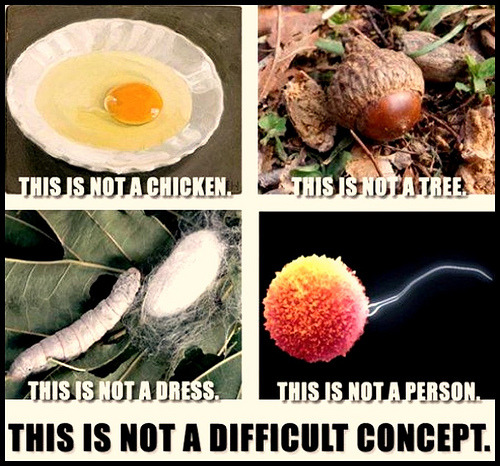Kelsey Hazzard has a great blog going over at Secular Pro-life, and I'm not sure how I missed it this long. I caught a glimpse of this post refuting the message of this picture:The pro-life response to this picture is sound, but how do you combat pictures in general? As we are but young idealists, we are oh so tempted to believe that logic will win the day. In reality, logic seems to determine but a small portion of human behavior.
To illustrate, let me use an anecdote from my own experience. Keep in mind, I am a graduate student in mathematics. If there is any group of people whose decision-making you would expect to be governed solely by rational thought, it would be my colleagues. And yet such is simply not the case. Last time I had a serious abortion discussion with a colleague, the argument ultimately came down to this: why are you defining life in such an inconvenient way for all of us?
If personal experience is any indication, the average person in the intelligentsia has no better argument directly defending abortion than an angry white Southerner from the 1950's had in favor of Jim Crow laws. I mean, seriously, look at a fetus. It's tiny, it's icky, it doesn't look like a person at all. Maybe when it's cute we'll give it rights. (After all, rights are nothing more than a social construct declared into existence by, well, us, of course. You know, the people who matter.)
As I see it, this is just where most people, even the smartest of us, are. Our ethics are more deeply tied to empathy than to logic. Abstract principles only get you so far when it comes to common ethical reasoning. If a group of people is ever going to be recognized as having rights as human beings, something has to successfully direct our empathy toward that group of people. When I contemplate this fact, it seems to me nothing short of miraculous that there is a pro-life movement at all.
Then again, someone has to keep making the arguments Kelsey is making. My guess is that the logical arguments themselves are not ultimately what changes public opinion, but they are what give the whole movement a backbone. I just get a little burnt out on the notion that we can change one mind at a time by just believing in the power of truth.
Getting back to my anecdote, I can remember one specific thing a colleague of mine said: "Science is not going to settle this issue." Perhaps this makes the most sense coming from a scientist. After all, who better to realize that the definition of "person" really has nothing to do with biology? Facts about human development simply don't tell us what it means to be human, and any responsible scientist should know that. Unfortunately, in our day this fact about the limits of our knowledge seems to give more license to scientists to treat the unborn as non-human. It's always painfully ironic the way we trade one form of intellectual hubris for another.
When asked why I care about the issue of abortion so deeply, I can only reply, why care about anything or anyone other than people I already see and know? Why care about the plight of the Sudanese? Why give money to Haiti or to Japan? Why give out micro-loans to people all around the world, people I'll never meet? Why do people oppose war or speak out for the rights of immigrants? If I had no attachment to the abstract idea of "human being," I would do none of these things. So it is with abortion. Some say a fetus is only a potential human being. I guess my gut reaction is simply, Why wouldn't you care about protecting a potential human being?
I just don't think logic by itself can produce such a gut reaction. Some shared presumption about the value of human life is simply missing in parts of our thinking. We're going to have to do more than get our facts straight if we're going to change that.

No comments:
Post a Comment
I love to hear feedback!